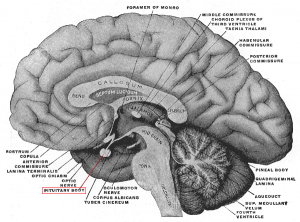Third Eye: Difference between revisions
Pablo Sender (talk | contribs) (Created page with "The '''Third Eye''' ==Pineal gland== ==Pituitary gland== The '''pituitary gland''', or '''hypophysis''' in vertebrate anatomy is an endocrine gland (known as the "master" end...") |
Pablo Sender (talk | contribs) No edit summary |
||
| Line 1: | Line 1: | ||
The '''Third Eye''' | The '''Third Eye''' (also known as the "Eye of Siva") is proposed to be an invisible eye which provides perception beyond ordinary sight. In [[Hinduism]] the third eye refers to the [[Chakras|ajna chakra]]. The third eye is often associated with religious visions, [[clairvoyance]], precognition, etc. | ||
==Pineal gland== | ==Pineal gland== | ||
| Line 17: | Line 17: | ||
<references/> | <references/> | ||
==Online resources== | |||
== | ===Articles=== | ||
*[http://www.theosophy.ph/encyclo/index.php?title=Pituitary_Gland# Pituitary Gland] at Theosopedia | *[http://www.theosophy.ph/encyclo/index.php?title=Pituitary_Gland# Pituitary Gland] at Theosopedia | ||
*[http://theosophytrust.org/tlodocs/articlesRNIyer.php?d=EyeofShiva.htm&p=91# The Eye of Shiva] by the Avatar | |||
*[http://www.theosophy-nw.org/theosnw/evol/ev-jvmj2.htm# The Third Eye and Human Evolution] by John Van Mater, Jr. | |||
*[http://theosophywatch.com/2009/01/12/third-eye-counting# Third Eye and Counting] by Theosophy Watch | |||
*[http://theosophywatch.com/tag/third-eye# Waking the Third Eye] by Theosophy Watch | |||
===Videos=== | |||
*[http://dev.forum-network.org/lecture/awakening-third-eye# Awakening the Third Eye] by Felix Conradi | |||
[[Category:Theosophical concepts]] | [[Category:Theosophical concepts]] | ||
Revision as of 16:25, 30 November 2012
The Third Eye (also known as the "Eye of Siva") is proposed to be an invisible eye which provides perception beyond ordinary sight. In Hinduism the third eye refers to the ajna chakra. The third eye is often associated with religious visions, clairvoyance, precognition, etc.
Pineal gland
Pituitary gland
The pituitary gland, or hypophysis in vertebrate anatomy is an endocrine gland (known as the "master" endocrine gland). In humans it is about the size of a pea and weighs 0.5 g (0.02 oz.). It is a protrusion off the bottom of the hypothalamus at the base of the brain, and rests in a small, bony cavity. This gland secretes nine hormones that regulate homeostasis.
According to H. P. Blavatsky this gland has an important role from an esoteric point of view:
There are seven cavities in the Brain . . . These cavities are called in Occultism the “Seven Harmonies,” the scale of the Divine Harmonies, and it is in these that visions must be reflected, if they are to remain in the Brain-memory. These are the parts of the Brain which receive impressions from the Heart, and enable the memory of the Heart to be impressed on the memory of the Brain.
The fourth of these cavities is the Pituitary Body, which corresponds with Manas-Antaskarana, the bridge to the Higher Intelligence; it contains various essences.[1]
The Pituitary Body is the organ per se of the psychic plane. Pure psychic vision is caused by the molecular motion of this body, which is directly connected with the optic nerve, and thus affects the sight, and gives rise to hallucinations. Its motion may readily cause flashes of light, seen within the head, similar to those that may be obtained on pressing the eyeballs, and so causing molecular motion in the optic nerve. When molecular action is set up in the Pituitary Body these flashes are seen, and further action gives psychic vision, as similar motion in the Pineal Gland gives Spiritual Clairvoyance. Drunkenness and fever cause disorderly motion in the Pituitary Body, and so produce illusions of sight, visions, hallucinations. This body is sometimes so affected by drunkenness that it is paralyzed, and the strict forbiddance of alcoholic liquids to all students of Occultism turns on this effect which alcohol produces on the Pituitary Body and Pineal.[2]
Notes
Online resources
Articles
- Pituitary Gland at Theosopedia
- The Eye of Shiva by the Avatar
- The Third Eye and Human Evolution by John Van Mater, Jr.
- Third Eye and Counting by Theosophy Watch
- Waking the Third Eye by Theosophy Watch
Videos
- Awakening the Third Eye by Felix Conradi
